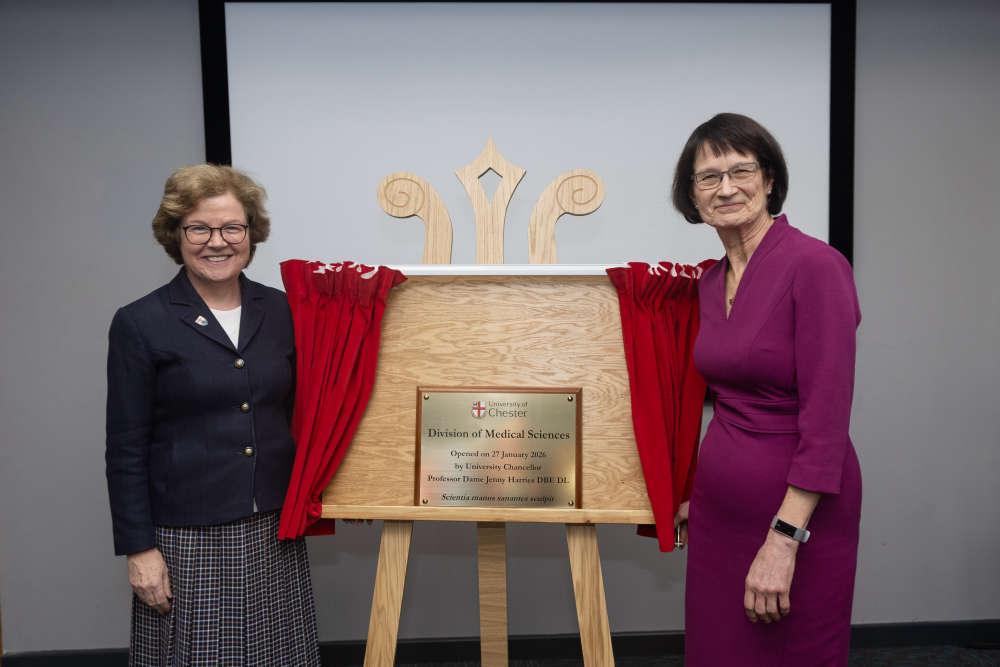The birth of a rare okapi has been caught on camera at Chester Zoo.
The “precious” calf was born to mum Ada and dad Stomp, following a 14-month pregnancy.
Charming footage, captured by the zoo’s CCTV, shows the calf falling to the ground in dramatic fashion, before clambering to its feet only minutes later and taking its first wobbly steps - a special moment that very few people in the world will have witnessed, according to wildlife experts.
Zookeepers have now revealed that the calf is male and they’ve named him Miloli, which translates to ‘joy’ in Bantu, a family of languages spoken in central Africa.
Having spent weeks tucked away in a quiet, hidden nest area, the shy youngster has slowly gained in confidence and has now ventured out for the first time.
Found only in the dense rainforests of the Democratic Republic of Congo (DRC), the okapi is so elusive that it went undiscovered to modern science until 1901. As a result, they’ve been nicknamed the ‘African unicorn’.
Fiona Howe, Lead Keeper at Chester Zoo, said:
“The birth of an okapi is always a very special occasion and cause for celebration, but have the privilege of being able to watch on as mum Ada calmly welcomed her new baby into the world and gently encouraged him to his feet, was nothing short of magical. The footage we’ve captured offers a special insight into one of nature’s most elusive and secretive species.
“Miloli has spent his early weeks of life tucked away in a quiet nest area, bonding with mum Ada. During the day, she’d head off and forage for food nearby, periodically returning to feed her new youngster with milk – she’s a doting mum and is doing everything perfectly so far which is just great to see.
“Though Miloli appears to be wearing black-and-white striped socks, these patterns play important roles - acting as camouflage and assisting young okapi in following their mothers in the forest. Now that he’s developed confidence, Miloli has just started to follow the stripes on his mother’s hind legs as she leads him out of the nest to explore together for the first time.”
The okapi is the national symbol of the DRC and is protected under Congolese law. Despite this, its population has declined by more than 50% over the last 20 years - driven by illegal hunting for their meat and skins, widespread habitat loss and the civil conflict in the country.
The world’s authority on the state of nature, The International Union for the Conservation of Nature (IUCN), has classified the species as endangered on its Red List of Threatened Species.
Sue Walker, Head of Science at the zoo, added:
"Our scientists have been supporting okapi reproduction for more than 15 years. By using the latest technologies to test hormones in okapi faecal samples, we can confirm the observations and behavioural changes recognised by zookeepers, and in the process learn more about the species and their biology. These findings have already been used to support the wider international conservation breeding programme that’s safeguarding okapi populations from extinction."
The zoo’s experts are also working alongside its partners at the Uganda Wildlife Authority to conduct surveys for okapis in Semuliki National Park, Uganda, which borders the DRC. The zoo is also a long-term supporter of the Okapi Conservation Project that is based at the Okapi Wildlife Reserve in the Ituri Forest, DRC.
Okapi Fact File
- DOB: The calf was born on 6 May 2025
- Scientific name: Okapia johnstoni
- Conservation status: Endangered (IUCN Red List)
- Habitat: Dense tropical rainforests of the Democratic Republic of Congo (DRC), Central Africa
- Closest relative: Giraffe – they share a similar skull structure and long, prehensile tongue
- Appearance: Brown velvety body with striking zebra-like stripes on their legs, which provide camouflage in forest undergrowth
- Diet: Herbivorous – feeds on leaves, twigs, fruit and fungi
- Behaviour: Solitary and elusive; rarely seen in the wild
- Reproduction: Gestation lasts around 14.5 months, usually resulting in a single calf
- First described: Officially discovered by the Western world in 1901
- Main threats: Habitat loss due to logging and mining, poaching for bushmeat, and political instability in their native range
Pictured - The birth of a rare okapi, one of Africa’s rarest mammals, has been captured on hidden CCTV cameras at Chester Zoo.

 Blues Match Preview: Chester v Radcliffe
Blues Match Preview: Chester v Radcliffe
 All state high schools in Cheshire will have phones locked away under Cheshire PCC’s initiative
All state high schools in Cheshire will have phones locked away under Cheshire PCC’s initiative
 Appeal for witnesses following Chester robbery
Appeal for witnesses following Chester robbery
 Fascinating Surinam toads breed at Chester Zoo for the first time
Fascinating Surinam toads breed at Chester Zoo for the first time
 Home of Medical Sciences officially opened by University of Chester Chancellor
Home of Medical Sciences officially opened by University of Chester Chancellor
 Two men jailed for their roles in County Lines drug dealing in Chester
Two men jailed for their roles in County Lines drug dealing in Chester
 HISTORIC CHESTER CHURCH SET TO CELEBRATE ST WERBURGH'S FEAST DAY AND 150th ANNIVERSARY
HISTORIC CHESTER CHURCH SET TO CELEBRATE ST WERBURGH'S FEAST DAY AND 150th ANNIVERSARY
 Man jailed for more than six years following successful police stop check in Chester
Man jailed for more than six years following successful police stop check in Chester
 Northgate Arena refurbishment on track for Spring 2026 as site reaches one-year milestone
Northgate Arena refurbishment on track for Spring 2026 as site reaches one-year milestone
 Prolific shoplifter banned from Ellesmere Port shops under Criminal Behaviour Order
Prolific shoplifter banned from Ellesmere Port shops under Criminal Behaviour Order
 Blues Match Report: Marine 2 - 1 Chester
Blues Match Report: Marine 2 - 1 Chester
 Chester and Wirral Football League - Weekend Round Up
Chester and Wirral Football League - Weekend Round Up
 Blues Match Preview: Marine v Chester FC
Blues Match Preview: Marine v Chester FC
 BAFTA Winner Brings Laughs to Charity Lunch at Carden Park
BAFTA Winner Brings Laughs to Charity Lunch at Carden Park
 Construction works for the new Cheshire Archive Centre
Construction works for the new Cheshire Archive Centre
Comments
Add a comment